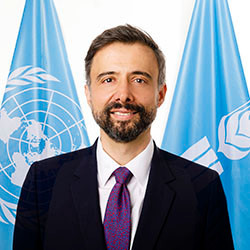A Shared Pathway for Financing Food Systems Transformation in Eastern Europe and Central Asia
IFAD Asset Request Portlet
Agrégateur de contenus
A Shared Pathway for Financing Food Systems Transformation in Eastern Europe and Central Asia
Opening statement by Alvaro Lario, President of IFAD
Par Alvaro Lario
Climate change, conflict, pandemic, and soaring prices are pushing millions of people deeper into poverty and hunger. We all know what that has meant for agriculture and rural communities.
Food systems are failing people, economies, and planet. Instability, conflicts, and migration will continue to increase unless we change how our food systems function and how they are financed. The global call to transform them is growing louder.
Small farms have a key role to play in sustainable, resilient healthy food systems. They are more efficient than large farms – growing more than one-third of the world’s food only 11 per cent of its farmland. They support greater biodiversity than large farms and are more respectful of the environment.
Small farms are also the anchors of healthy, resilient, and secure communities. When small farms are successful and resilient, they stimulate rural economies. They contribute to the growth of new businesses and jobs that bring more cash into rural areas and more employment opportunities on and off the farm. And this, in turns, provides an outlet for the energy and creativity of young men and women, who might otherwise be forced to migrate or be lured into militancy or extremism.
But transforming food systems so they are truly inclusive and sustainable requires a paradigm shift.
It requires building on food systems in national pathways and prioritizing interventions that have proven and measurable benefits for rural women and men.
It requires a recognition by national governments and the multilateral system alike that putting rural communities at the centre of development is not just a mark of social justice – it is also a condition for resilient and efficient food systems.
And it requires financing.
Let me be clear – I am not asking for additional public finance alone. There must be a global partnership that brings together governments, the private sector, other International Financial Institutions and development banks, UN agencies--and poor rural people themselves.
At IFAD, we have worked for more than four decades to finance agriculture and rural development and lift up the world’s poorest communities.
IFAD acts as an assembler of development finance targeted at the poorest people. Each dollar of core contributions to IFAD delivers $6 to $8 of investment through cofinancing and partnerships.
To have the biggest possible impact, IFAD has reformed its financial architecture to increase borrowing capacity, and diversified partnerships and sources of finance. We were the first UN agency to receive a credit rating. And in June, we issued our first Sustainable Development Bonds.
As part of the Finance in Common Summit, IFAD is building a coalition of 75 national, regional, and international Public Development Banks to unlock more financing for sustainable agriculture and food systems. We also welcome opportunities to reallocate Special Drawing Rights (SDRs) to support vulnerable rural people.
We will also continue to make transforming food systems a priority of our programme of loans and grants.
IFAD and others in development can offer support. We can invest and work as partners. But the main drivers of change need to be countries themselves. This is why IFAD’s investments align with country-led plans and national priorities for food systems. Our role is to contribute by providing funding, technical and policy support and help leverage coalitions, resources, and knowledge. IFAD and others in development institutions can offer support. We can invest and work as partners. But the starting point is always national priorities and pathways.
In this regard, Uzbekistan stands out as a champion of putting small-scale agriculture at the centre of its plans for transforming food systems. Our joint achievements over recent years in the horticulture, livestock and dairy sectors provides a strong foundation for future work together. We look forward to achieving strong results for the country and its people through the new COSOP for 2023 to 2027. The recent signing of a Host Country Agreement will further strengthen our partnership by paving the way to opening IFAD’s first country office in Uzbekistan.
We equally appreciate the partnership with the other countries of the region. For example, Bosnia and Herzegovina was an early partner in pioneering IFAD’s response to the impact of the COVID 19 in the agricultural sector. At the Government’s request, we were able to quickly repurpose resources for an ongoing project to allow for the emergency delivery of seeds, seedlings, and fertilizer packages to 9,000 households. As a result, production continued without interruption and there were no serious food shortages in an area affected by import restrictions.
The region also has one of the most successful natural resources management projects in IFAD – the Murat River Watershed Rehabilitation Project in Turkiye. It is a model of how forest, water, and agricultural natural resources can contribute to better livelihoods and transform the quality of living in rural areas, while at the same time reducing the emission of greenhouse gasesThis was achieved through establishing forests, rehabilitating rangeland, controlling erosion l, implementing sustainable farming practices, and establishing small and medium sized enterprises.
I would like to call on everyone gathered here today for the DFI roundtable to build a strong consensus on rural transformation in the ECA region based on nature-positive, climate-smart agriculture and small business that create value for people, planet, and the economy.
Food security is national security. During the height of the COVID crisis, when national and even regional borders were closed, it was the local producers who ensured their communities, and neighboring towns and cities, had a sufficient supply of food.
Let us think long-range, and from the ground up, and commit ourselves to work together.
